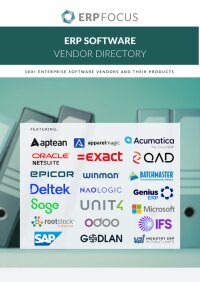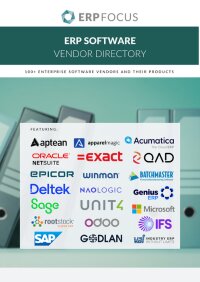Five questions to ask potential job shop ERP vendors
Make-to-order businesses range from very complex, one-time-ever jobs for a single unit to be delivered, to jobs with many units to be delivered that run in a short time period. Yet they all have a discrete product to be made and delivered at the end. Job shop ERP systems should streamline this process, so it’s important that potential ERP vendors give you as in-depth a look into their software’s features as possible before you sign the contract.
1. “How quickly can I develop a quote and will the quote transfer and serve as estimated job cost?”
If your business process includes a quote that your customer uses as a basis to award work, you have already put a lot of effort into preparing that quote and don’t want to repeat that effort. Your make to order ERP vendor should demonstrate how that quote is developed in the ERP and you need to be sure it is detailed enough.
The quote will use a bill of materials that has the cost of those materials and a supplier. The quote should have a routing with time estimated in many operations each at a unique rate per hour. It might also require subcontract work. What you want to see is all that data moved from the quote to the job when the bid is won. Now you can measure your actual work and costs against the quote that won the work.
Recommended reading: find job shop ERP software with our completely up-to-date ERP vendor directory.
2. “Will this ERP integrate with my CAD system?”
Your business uses computer-aided design tools and you want to see that the job and your drawings are integrated along with any CAM equipment. Your make to order ERP should be able to take a drawing and build the BOM for the job and all the process steps right from your drawing. The same data can then be shared with your equipment, taking care of much of the programming.
3. “Tell me how your ERP scheduling works to increase my return”
Whether you work on one job at a time or juggle many jobs, they all need to be scheduled. Your customer has a delivery date in mind. Those jobs need materials purchased and on hand before operations can even begin. There is a critical path of operations to be completed before delivery. When you schedule many jobs, the same resources and people work on many jobs and time is limited to 24 hours per day. A good job shop ERP should provide you with scheduling tools and options to help ensure all the work is completed as needed, so make potential vendors go into as much detail as possible on this one.
4. “Does this ERP track job cost and how does it show job profitability?”
Your gross profit is the revenue from a job minus the cost of that job. Cost can be challenging as it is accumulated over time and much of it is shared with other jobs. Job costing in make to order ERP should accurately distribute costs of all kinds to jobs based on your rules and your local accounting practices.
5. “Show me how ERP helps me manage jobs”
Jobs will run on time, late, and early. The estimates you used for any job are just that – estimates. Job shop ERP needs to track activities in real time and provide warnings if any job is in danger of running late or over cost. Jobs should be rescheduled regularly to match with real-time data. When a customer calls to ask about their job, ERP should have the tools you need to answer that question immediately and authoritatively.
Free white paper

ERP Software Vendor Directory
Put the most comprehensive ERP vendor directory on your desk today



